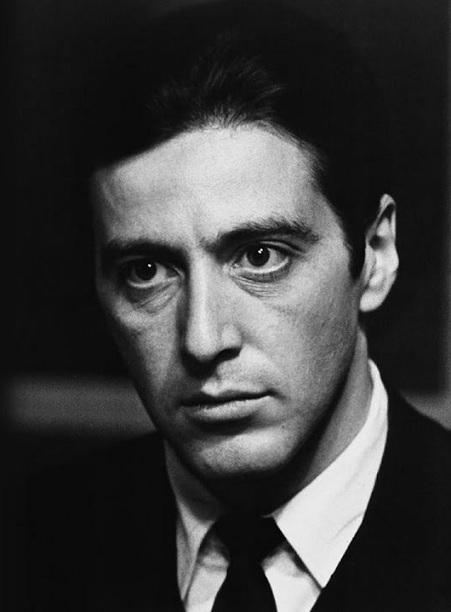AS FRANCIS FORD COPPOLA'S FILM TURNS 50 NEXT WEEK

Al Pacino recently spoke by phone to Dave Itzkoff of the New York Times about The Godfather, which was released 50 years ago, on March 15, 1972. At one point, Itzkoff brings up Pacino's role as Tony Montana in Brian De Palma's Scarface:
There is an intense quietness to how you play Michael in “The Godfather” that I don’t think I ever saw again in your other film performances, even the later times you played him. Was that a part of yourself that went away or was it just the nature of the character that called for it?I’d like to think it was the nature of that particular person and that interpretation. I can’t think of any other characters that I did that could have used that kind of framework. I was a young actor — on “Part III,” I was no longer young, but that’s not my fault. [Laughs]
But compared to other characters you’re also closely associated with, like Tony Montana in “Scarface” ——
Well, that character, Tony Montana, was written by Oliver Stone and directed by Brian De Palma, who wanted the heightened reality. Brian wanted to do an opera. All I wanted to do was imitate Paul Muni. [Laughs] But if I put “Dog Day Afternoon” with “Godfather,” or “Serpico,” I don’t see a resemblance there. Would you call Michael more introspective? That’s what I would say. And I don’t know of any other introspective characters I played. But if I sit down with you and go to the almanac, we’ll find something.
Pacino mentions De Palma earlier in the article, while talking about meeting Francis Ford Coppola:
When you get a call asking you to talk about “The Godfather,” is there some part of you that thinks, oh God, not again? Does it ever become tedious?Well, no. You expect it. You expect to talk about what things worked and what things didn’t. You get a sense that somebody’s going to come at you. You just go: OK, been here, done this. But it’s cool. It beats talking to myself about it.
How did the role of Michael Corleone first come up?
At that time in my life, I didn’t have a choice. Francis wanted me. I had made the one film. And I wasn’t as interested in film to the extent that I became interested. My head was in another space. I felt out of place in the early films that I made. I remember saying to my friend Charlie [his mentor, the acting teacher Charlie Laughton]: Wow, they talk about it being real, but meanwhile it’s not. Because there are wires all over you. And also, you’ve got to do it again! [Laughs] You do it and they say, well, go again, do it again. It’s real and not real at the same time. Which takes some getting used to.
When did you and Coppola meet?
To give a little history to it, Francis was this filmmaker who had Zoetrope [his production company, American Zoetrope], and people like Steven Spielberg and George Lucas and [Martin] Scorsese and [Brian] De Palma were all part of a group. And I remember seeing a few of them when Francis asked me to come to San Francisco after he had seen me in a play on Broadway. Do you know that story? I’m telling old stories now. [Laughs]
That’s OK. It’s why we’re here.
He saw me onstage [in the 1969 Broadway run of “Does a Tiger Wear a Necktie?”] but I never met him. He had written “Patton” by that time, and he sent me a script for a wonderful love story he had written [which was never produced]. He wanted to see me. That meant I had to get on a plane and go to San Francisco, which is something I was not used to. I thought, is there any other way to go? I can’t tell this guy to come all the way back here, can I? So I said I’ll bite the bullet and I went. I spent five days with him. It really was special, this film. But we were rejected, of course. I was an unknown actor and he had made a couple of films, “You’re a Big Boy Now” and “The Rain People.” So I went back home and never heard from him again.
But you did, eventually. When was that?
“Panic in Needle Park” hadn’t come out yet. And I got a call from Francis Coppola — a name from the past. First, he says he’s going to be directing “The Godfather.” I thought, well, he might be going through a mini-breakdown or something. How did they give him “The Godfather”?
You didn’t think it was possible that he was making it?
I’ve got to tell you, it was a big deal already. It was a big book. When you’re an actor, you don’t even put your eyes on those things. They don’t exist for you. You’re in a certain place in your life where you’re not going to be accepted in those big films — not yet, at least. And he said, not only was he directing it, [breaking into laughter] but he wanted me to do it. I’m sorry, I don’t mean to laugh here. It just seemed so outrageous. Here I am, talking to somebody who I think is flipped out. I said, what train am I on? OK. Humor the guy. And he wanted me to do Michael. I thought, OK, I’ll go along with this. I said, yes, Francis, good. You know how they talk to you when you’re slipping? They say, “Yes! Of course! Yes!” But he wasn’t. It was the truth. And then I was given the part.



